Panama 29 November to 15 December 2009
"Is there a lot of snow in Ukraine?", asks the policeman in Spanish at the roadblock on the Pan-American. I look at him blankly and his colleague asks "What's the capital of Ukraine?" I go even more blank and the first cops says confidently "Kiev". They're looking at our "Importacion Temporal" documents for the bikes.

Pat unpacking an early Christmas present at Panama Airport.
The one-fingered novice customs officer at the airport had typed in "UK" for the bikes' origin. Unfortunately the Panamanian computer thought this meant Ukraine and the officer refused to change it to GB. Indicating way above my head, I assure the cops that there's a huge amount of snow in Ukraine and that it's much nicer in Panama (getting hotter and sweatier by the minute in all our gear out there in the sun on a baking motorway.) They wave us on cheerfully. We begin to worry about exiting Panama on Ukrainian papers. We like Panama - it feels safe, people are very friendly and the food's great - we gorged on pineapples at 50cents and more prawns than we could eat for about a dollar. The Panamanian Balboa is effectively the US dollar - all the notes are dollars. The approach to Panama City looked like the arrival into Miami or New York with reams of skyscrapers on reclaimed land,
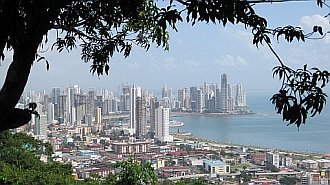 but the area around the brilliant Mamallena hostel was purely local: bustling fruit, veg and fish markets, pavement stalls selling Christmas frippery, homicidal buses
but the area around the brilliant Mamallena hostel was purely local: bustling fruit, veg and fish markets, pavement stalls selling Christmas frippery, homicidal buses
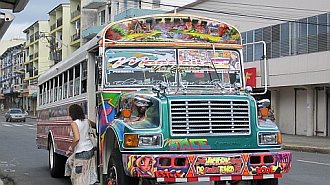
....Know your Enemy! One bus had "No Mercy!" on its bumper...
and tiny Kuna with their bright orange beaded legs and nose rings standing around on the corners. The Kuna are the indigenous people from the San Blas islands and the Caribbean coastline which runs down to the Colombian border. Rarely amongst the indigenous in Central America, they've managed to wrest control of their own territory from the federal government. Panama's wealth and stability is all down to the Canal. And now that the Panamanians have taken it back from the Americans, they're investing it in social infrastructure such as pensions and hospitals. Every taxi driver will proudly tell you the biggest ships have to pay $350,000 for their 8-hour transit - in cash and in advance, so it's very profitable. It's based on weight, and the record for the least expensive transit went to an American who swam through in 1928 and was charged 36 cents.
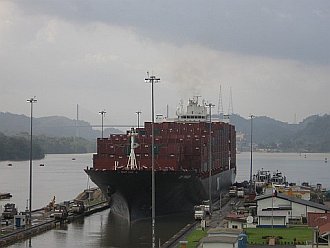
We watched massive cargo ships inch their way through the lock being dragged by little trains. One ship can displace 50 million tons of water and the whole system is managed by gravity alone - ships are raised and then lowered 26 metres through three locks. Thousands of labourers died in the construction, felled by disease and accidents before it was finally completed in 1914. The Panamanians are busy constructing an extension right now to take the world's biggest vessels in time for the centenary celebrations. We're rather glad we left home at the end of November and not earlier, as Panama does serious rain and the rainy season is supposed to be over.... The day we set off from the city heading westwards (Pat having refused to let me brave the Darien Gap which is infested with guerillas, smug drugglers, unfriendly indigenous people, swamps and mosquitoes as big as labradors and numerous other bitey things), we met with a massive thunderstorm on the motorway. No time for waterproofs, we were soaked in seconds. The storm cracked and crashed above our heads for four hours as it crept along our road somewhat more slowly than we were riding. We sought shelter whenever we couldn't see the surface any more and at one point hid under a bridge with two cars (one parked in the fast lane) and a dry but morose man who assured us it would go on for the rest of the day. When I unlaced my boots the water inside was above my sock level. We could see blue sky off to our left but unfortunately there was no road to escape to. From under that same bridge we watched waves of water from vehicles on the other carriageway swooshing over the wall onto our side. We eventually admitted defeat and baled out at the next exit to an expensive hotel on the coast with fierce airconditioning and dried out. It hadn't rained there at all.
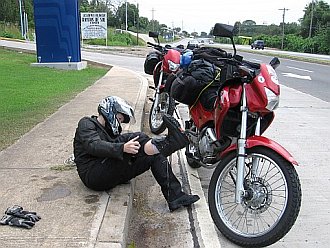
Sho empties her boot after finally escaping the storm
Our worries about exiting Panama on Ukrainian bikes were unfounded. They weren't interested at all and stamped us out smartly. Costa Rica entry was another matter... Pat reminds me I've conveniently forgotten to mention various other things... I fell off on a corner in the middle of Panama city on our first day, just five minutes after leaving the hostel, and in front of a very surprised policeman. I was equally surprised. And that I ran out of petrol on the motorway on the way back from collecting the bikes at the airport - it was rush hour and had gone dark, as our novice customs officer had taken two hours to fill in our one page bike import documents. I'd used up too much of my allocation of about a litre running backwards and forwards across the airport getting photocopies.... Other memorable things about Panama - extremely hot at sea-level and lovely up in the hills at about 700 metres. We spent a couple of very hot days out in the San Blas islands swimming and snorkelling on a tiny island with about 8 other tourists and 4 Kuna families.
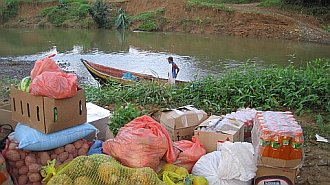
Loading the boat with supplies for San Blas.
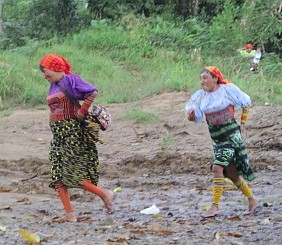
Kuna Women in their traditional costumes.
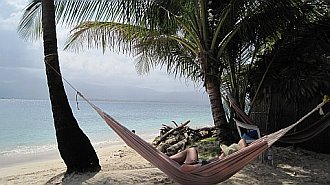
Pat relaxing after a hard day snorkelling.
We also made a couple of forays off the Pan American Highway up into the hills to Santa Fe and Boquete. Santa Fe is at that rare stage of development where there is just enough infrastructure for tourists - ie a couple of little places to stay, some shops and a market plus wonderful hikes and drives, but normal life goes on regardless, as does the rain. No wonder it's so nice and green.
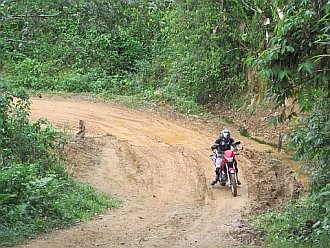
First mud of the trip...
We stayed in a delightful hostel in Santa Fe called La Quia, run by a Belgian woman and her Argentinian partner and their 5 year old - the place was swarming with kids at one point. Boquete is much bigger but offers lovely scenic riding country - we did some great loops out of it.
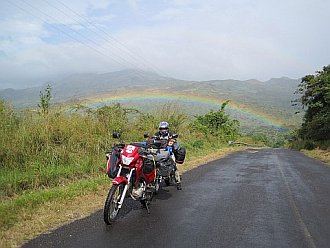
Rainbow free with each shower.
The day before we left the country, the Banco de Panama swallowed Pat's card, deducted $300 from her account, spat the card out but no money.... Bank was open so we went in only to be told to come back next day when they'd done their reconciliation. We did so and the Rosa Klebb-like female manager told us their accounts were correct and we must have left before the money was delivered.....so not their problem. The nice man we'd first spoken to told us there had been problems with this machine before and a girl in our hostel told us her friend had lost money from the same bank, so we went to the police and made a 'Denuncia'... All this (plus phoning Nationwide) took three hours so instead of arriving at the border nice and early, we arrived in the heat of the day...
